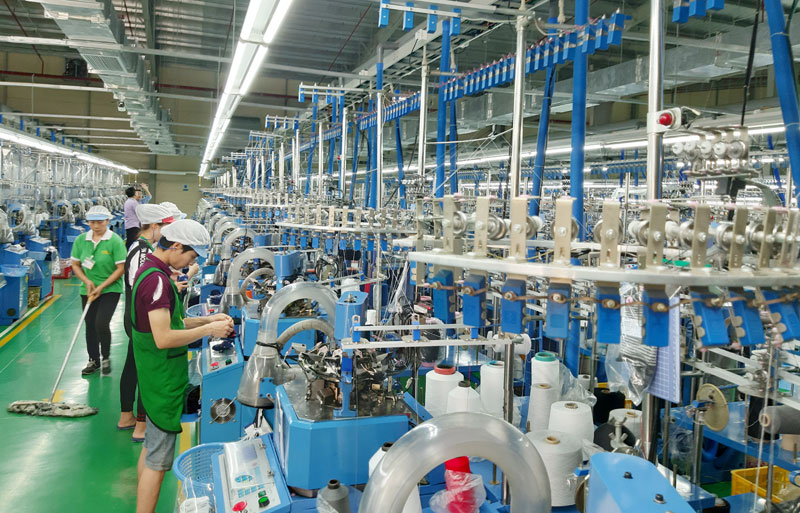
(HBO) – The Party Committee and People’s Committee of Hoa Binh province are carrying out measures to mobilise capital for development investment and remove difficulties facing production and business activities so as to promote economic growth.
The
resolution of the 16th provincial Party congress for 2015-2020 has set the
target of an annual GRDP growth rate of at least 8.5 percent. By 2020, the
proportion of industry-construction in the local economy will increase by 10.44
percent, agro-forestry-fisheries down 6.32 percent, and services up 4.12
percent.
![]()
 The Hoa Binh Knitting JSC, based in the Da River Left
Bank Industrial Park of Hoa Binh city, has provided jobs for more than 400
local residents.
The Hoa Binh Knitting JSC, based in the Da River Left
Bank Industrial Park of Hoa Binh city, has provided jobs for more than 400
local residents.
To that end, the provincial People’s Committee
has assigned concrete tasks to departments, sectors and localities to tackle
difficulties and boost growth.
The Department of Finance has to mobilise
additional funding for development investment and cut down regular spending
while still ensuring capital for the implementation of social policies in line
with principles and allocation plans.
The Hoa Binh branch of the State Bank of Vietnam
needs to direct local credit organisations to facilitate businesses, cooperatives,
cooperative groups and households’ access to credit sources. It also has to
encourage credit organisations to open transaction points in rural areas to
meet local credit demand.
Meanwhile, the Department of Agriculture and
Rural Development has to give counseling in terms of farmland use restructuring
while keeping the current area of cultivation stable. It also needs to guide businesses,
cooperatives, business households and farmers in developing production in
accordance with plans and applying high technology, thus improving product
quality and minimise unplanned agricultural practices. Additionally, the agency
needs to carry out solutions to link production expansion with the market’s
demand.
The Department of Industry and Trade is
requested to take measures to boost export and expand markets while
coordinating with the customs department and relevant agencies to simplify
administrative procedures for export-import activities. The department was also
told to improve the management of industrial and mining activities and work
with the Hoa Binh Power Company to build power supply plans to meet economic
and daily activities.
The Department of Construction will have to
review and deal with difficulties facing the projects exploiting limestone for the
production of building materials so that these projects can be resumed.
The Department of Natural Resources and
Environment needs to propose solutions to solve land disputes between
businesses and local residents in order to harmonise both sides’ interests and
ensure people’s livelihoods. It was also directed to create clean land for
investment attraction.
The Hoa Binh management board of industrial
parks was ordered to overhaul the planning of industrial parks and support the
projects already granted with investment certificates to accelerate their
implementation.
Besides, the provincial People’s Committee
assigned the Department of Transport to assist provincial leaders in proposing
the Ministry of Transport supplement the upgrade of National Highways 70 and 15
to the public investment plan. The agency was also asked to enhance
coordination with Son La province to speed up the construction of Hoa Binh –
Moc Chau highway.
Meanwhile, the People’s Committees of
district-level localities were demanded to resolve obstacles in site clearance
in a timely manner to make land ready for public investment and socio-economic
development projects. They were told to carry out administrative reforms in a
more substantive manner to facilitate people and businesses’ activities./.
In Lac Thuy district, communes have been succeeded in promoting their One Commune-One Product (OCOP) products while others are still struggling to position their typical farming products in market. Some communes in the district still fail to have their products met OCOP programme’s requirements, while others have seen their certifications expired.
The inspectorate agency of Hoa Binh province has issued Official Dispatch No. 1090/TTr-PCTN to provincial departments, agencies, localities, business associations, enterprises, and investors regarding measures to improve informal component indexes of the Provincial Competitiveness Index (PCI).
Hoa Binh is taking concrete steps to improve its investment environment, with a strong focus on supporting businesses, settling obstacles for strategic investors, and creating opportunities for robust development in the coming years.
Under the blazing early summer sun, the construction site of Nhuan Trach Industrial Park (IP) in Luong Son district is abuzz with activities from dawn to dusk, a testament to the determination of the investor to meet their construction targets on schedule.



 The Hoa Binh Knitting JSC, based in the Da River Left
Bank Industrial Park of Hoa Binh city, has provided jobs for more than 400
local residents.
The Hoa Binh Knitting JSC, based in the Da River Left
Bank Industrial Park of Hoa Binh city, has provided jobs for more than 400
local residents.